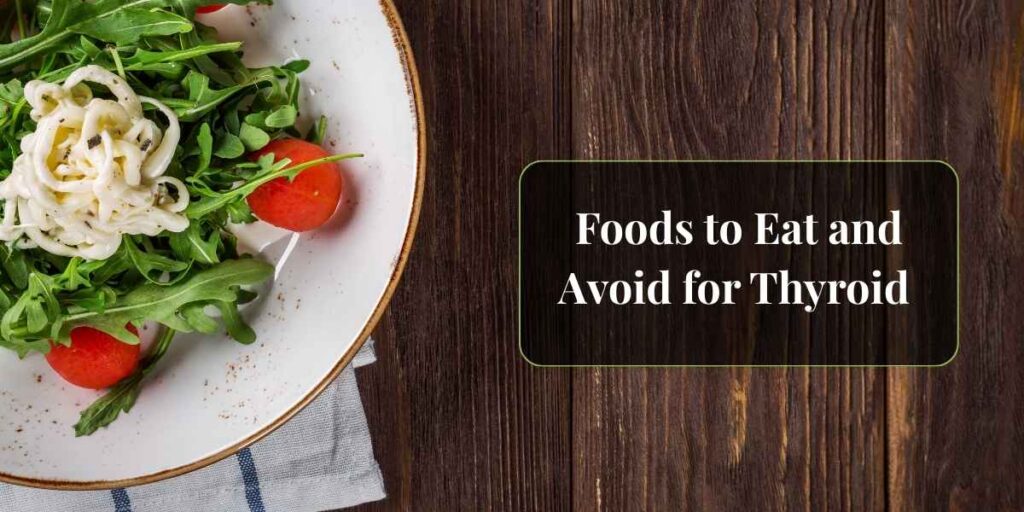Your thyroid is a small, butterfly-shaped gland found at the base of your neck, and despite its size, it has a major impact on your body’s overall health. This gland helps regulate metabolism, energy levels, mood, body temperature, and heart rate. When it doesn’t function properly, it can lead to hypothyroidism—a condition where hormone production is too low, causing tiredness, weight changes, and other noticeable symptoms. In this guide, we’ll cover the foods to eat and avoid for thyroid, those you should include, and a few inflammatory triggers worth watching out for. Let’s begin.
Medication and regular checkups are essential, but lifestyle choices, especially diet, greatly influence how well hypothyroidism is managed. Eating the right foods can boost hormone function, lessen fatigue, aid in weight control, and promote better well-being. Meanwhile, certain foods can actually interfere with hormone activity or slow their absorption, making symptoms harder to control.
What is Thyroid (Hypothyroidism)?
Hypothyroidism happens when the thyroid gland is unable to release enough of the hormones thyroxine (T4) and triiodothyronine (T3). These two hormones are crucial because they keep your metabolism working properly and allow cells to function at a normal pace. When the thyroid slows down, so does the body, which can bring about both physical and emotional challenges that interfere with everyday activities.
Common Causes
- Autoimmune disease (Hashimoto’s thyroiditis)
- Iodine deficiency
- Thyroid surgery or radiation
- Certain medications
Common Symptoms
- Fatigue
- Weight gain
- Cold intolerance
- Depression
- Hair thinning
- Constipation
- Dry skin
- Irregular or heavy periods
Treatment often includes synthetic thyroid hormone to restore balance, but medication alone is not always enough. Choosing a diet that supports thyroid activity can make a noticeable difference, helping the body absorb treatment more efficiently while also easing troublesome symptoms over time.
Top Foods to Avoid with Hypothyroidism
Some foods can interfere with thyroid activity and may worsen symptoms if eaten regularly or in large amounts. Being mindful of your diet is important when managing hypothyroidism. Below are the top 10 foods that are best limited or avoided:
Soy Products
Soy is rich in isoflavones, plant compounds that may inhibit the production and absorption of thyroid hormones. This can make your medication less effective if consumed in large quantities. Common soy-based foods to watch out for include:
- Soy milk
- Tofu
- Tempeh
- Edamame
Note: If you choose to include soy in your diet, try spacing it several hours apart from your thyroid medication, as this can reduce the risk of interference and allow your treatment to work properly.
Cruciferous Vegetables (Raw)
Vegetables like:
- Broccoli
- Kale
- Cabbage
- Cauliflower
- Brussels sprouts
Contain goitrogens—compounds that can impair thyroid hormone production. Eating these vegetables raw in large amounts may affect thyroid function negatively. However, cooking significantly reduces goitrogens, making these vegetables safer to consume. Including cooked cruciferous vegetables in moderation allows you to benefit from their nutrients without heavily impacting thyroid health.
Gluten
Many people with hypothyroidism, especially those with Hashimoto’s, have gluten sensitivity or celiac disease. Gluten can:
- Trigger an autoimmune response
- Inhibit nutrient absorption
Consider going gluten-free to reduce inflammation and help support thyroid function, especially if you notice worsening symptoms after consuming gluten-containing foods.
Processed Foods
High in sodium and unhealthy fats, processed foods can worsen:
- Weight gain
- Blood pressure
- Inflammation
Common culprits: Chips, frozen dinners, packaged snacks, instant noodles. These foods often contain additives and preservatives that may promote inflammation and negatively affect thyroid health. Limiting their intake can help reduce these risks and support better overall metabolic function.
Sugary Foods
Hypothyroidism slows metabolism, making it harder to burn calories. Sugary foods spike insulin and may lead to:
- Weight gain
- Fatigue
- Mood swings
Avoid soda, pastries, sweetened cereals, and excessive desserts. Consuming too much sugar can also cause energy crashes and increase inflammation, both of which can worsen hypothyroid symptoms over time.
Fried Foods
- Trans fats and refined oils in fried foods may impair thyroid hormone absorption and raise LDL cholesterol.
- Examples: French fries, fried chicken, doughnuts, pakoras.
These unhealthy fats not only affect thyroid function but also contribute to cardiovascular risks, which people with thyroid issues should be careful about. Choosing healthier cooking methods like baking or steaming is a better option for maintaining hormone balance.
Caffeinated Beverages (In Excess)
Too much caffeine can:
- Interfere with thyroid medication
- Worsen anxiety, insomnia, and palpitations
Avoid large quantities of coffee, energy drinks, or black tea—especially near medication time. Caffeine can affect how well your thyroid medication works and may increase some symptoms related to hypothyroidism, so moderation is important.
Alcohol
- Alcohol disrupts thyroid hormone production and can strain the liver, which processes hormones.
- Limit or avoid alcohol for optimal thyroid function.
- Regular consumption can delay hormone regulation and worsen inflammation, making thyroid conditions harder to manage effectively.
Highly Refined Grains
White bread, pasta, and baked goods offer little nutrition and can spike blood sugar levels. Opt for whole grains instead.
Whole grains provide fiber and essential nutrients that help maintain stable energy levels and support metabolic health, which is crucial for those with hypothyroidism.
Excess Fiber
While fiber is important, too much can interfere with medication absorption. If you eat a high-fiber diet, adjust the timing of your meds accordingly.
Balancing your fiber intake and medication schedule ensures you get the full benefit of your treatment without any absorption issues.
Top Foods to Eat for Thyroid Issues (Hypothyroidism)
Now, let’s look at thyroid-friendly foods that provide nutrients essential for hormone production and overall wellness. Including these foods in your diet can help support thyroid function, boost energy, and alleviate some symptoms associated with hypothyroidism. These foods are rich in vitamins, minerals, antioxidants, and healthy fats that promote a balanced metabolism and reduce inflammation. Consistently choosing thyroid-friendly options will contribute significantly to your overall health and help maintain hormone balance naturally.
Iodine-Rich Foods
Iodine is essential for producing thyroid hormones that regulate metabolism and energy. Natural sources of iodine include:
- Seaweed (nori, kelp, wakame)
- Iodized salt
- Cod and other ocean fish
- Dairy (moderate intake)
Note: While iodine supports thyroid health, consuming too much can worsen autoimmune thyroid conditions like Hashimoto’s. It’s important to maintain a balanced intake, focusing on moderate consumption from natural food sources to help your thyroid function well without causing harm.
Selenium-Rich Foods
Selenium helps convert the inactive thyroid hormone T4 into the active T3 form, which your body uses. Foods rich in selenium include:
- Brazil nuts (2–3 per day)
- Sunflower seeds
- Tuna
- Turkey
Besides aiding in hormone conversion, selenium acts as an antioxidant, protecting thyroid cells from damage and supporting immune health. Adding these foods regularly can improve thyroid function and reduce oxidative stress associated with thyroid disorders.
Zinc-Rich Foods
Zinc plays a part in making thyroid hormones. Including these foods can be beneficial:
- Pumpkin seeds
- Chickpeas
- Beef
- Eggs
Zinc is important because it supports the enzymes that help produce thyroid hormones. Without enough zinc, the thyroid can’t work as well. Adding these foods regularly gives your body the nutrients it needs to keep hormone levels balanced and maintain overall thyroid health.
Vitamin D Foods
Many people with hypothyroidism lack enough vitamin D. To boost it, eat:
- Fortified milk or plant-based milk
- Fatty fish (salmon, sardines)
- Egg yolks
- Sunlight exposure
Vitamin D is vital for a strong immune system, which helps control inflammation tied to thyroid issues. Getting the right amount of vitamin D can improve mood, energy, and how well the thyroid functions overall.
Tyrosine-Rich Foods
Tyrosine is an amino acid needed to make thyroid hormones. Good sources include:
- Chicken
- Turkey
- Dairy
- Avocados
- Almonds
Tyrosine serves as the building block alongside iodine for hormone production. Eating these foods regularly helps provide your thyroid with what it needs to produce hormones that regulate metabolism and energy levels effectively.
Antioxidant-Rich Fruits
Support immune health and reduce inflammation with:
- Blueberries
- Strawberries
- Pomegranate
- Cherries
These fruits are packed with antioxidants that help protect the thyroid from oxidative stress and reduce inflammation, which is especially helpful for people with hypothyroidism. Eating a variety of these fruits regularly can boost your immune system and support overall thyroid wellness.
Leafy Greens (Cooked)
Cooked spinach, kale, and collard greens offer iron, magnesium, and calcium—important for thyroid and energy levels.
Cooking these greens makes their nutrients easier to absorb, which helps in maintaining healthy energy levels and supports thyroid hormone production. Including cooked leafy greens in your meals can also improve digestion and reduce fatigue.
Whole Grains (Gluten-Free Options)
Choose:
- Quinoa
- Brown rice
- Millet
- Buckwheat
These whole grains provide B vitamins and fiber that promote steady energy and improve digestion, two areas often affected by hypothyroidism. Opting for gluten-free grains can be gentler on the gut, especially if you have gluten sensitivity.
Nuts & Seeds
Besides selenium and zinc, they offer healthy fats to reduce inflammation. Try:
- Flaxseeds
- Walnuts
- Chia seeds
Nuts and seeds are excellent snacks that supply essential minerals and omega-3 fatty acids. These nutrients help calm inflammation and support healthy thyroid function while also aiding heart and brain health.
Water
Hydration helps with metabolism, digestion, and toxin removal—functions often impaired in hypothyroidism.
Drinking plenty of water throughout the day keeps the metabolism active and helps flush out toxins that could otherwise interfere with thyroid function. Staying hydrated also supports healthier skin and improved energy levels.
Some Inflammatory Foods to Avoid with Hypothyroidism
Chronic inflammation has a direct impact on thyroid health, as it can interfere with hormone production and worsen autoimmune activity. Consistently eating highly processed or inflammatory foods may trigger flare-ups, slow down metabolic processes, and contribute to worsening symptoms over time. For individuals with hypothyroidism, it becomes essential to be mindful of dietary patterns that aggravate inflammation and strain the thyroid. Below are some common inflammatory triggers to consider avoiding:
- Artificial additives and preservatives (such as MSG, sulfites, and nitrates) – These can overstimulate the immune system and promote oxidative stress, which may aggravate thyroid-related issues.
- Refined sugar and sweeteners (including high-fructose corn syrup and aspartame) – Excessive sugar disrupts blood sugar balance, increases systemic inflammation, and may worsen energy crashes and fatigue.
- Hydrogenated oils and trans fats – These unhealthy fats interfere with healthy cell signaling, trigger inflammatory pathways, and impair nutrient absorption, potentially affecting thyroid hormone conversion.
- Red meat (when consumed in excess) – Large amounts of red meat can increase inflammatory markers, cholesterol imbalance, and digestive strain, which may worsen hypothyroid symptoms.
- Dairy (particularly for lactose-sensitive individuals) – Dairy proteins are difficult to digest for many and can trigger immune responses or digestive discomfort, increasing overall inflammation.
- Gluten (especially problematic in Hashimoto’s thyroiditis) – Gluten sensitivity is closely linked to autoimmune thyroid conditions, and removing it may help reduce flare-ups and calm the immune system.
By cutting down exposure to these triggers, people with hypothyroidism often notice improvements in everyday symptoms such as fatigue, brain fog, joint pain, and sluggish metabolism. Over time, a cleaner and anti-inflammatory approach to eating can support better thyroid balance, improved digestion, and more stable energy levels.
Important Considerations
When working to manage hypothyroidism through dietary choices, it’s essential to remember that even small adjustments can have a big impact on how your thyroid medication works and how your body responds. Staying consistent and making informed decisions provides a solid foundation for symptom control and long-term wellness. Keep the following points in mind:
Timing of Thyroid Medication
- Take levothyroxine on an empty stomach, ideally first thing in the morning, and wait at least 30–60 minutes before eating breakfast. This helps ensure maximum absorption of the hormone replacement.
- Avoid combining your dose with calcium or iron supplements, coffee, or high-fiber foods right afterward, as these can interfere with absorption and reduce the medication’s effectiveness. Even habits like morning coffee should be timed carefully to prevent fluctuations in thyroid levels.
Goitrogens Aren’t Always Bad
- While foods like broccoli, kale, cabbage, and soy are often labeled as “goitrogenic” because they may interfere with thyroid hormone production, cooking them deactivates most of the problematic compounds.
- Therefore, unless consumed in unusually large amounts every day, these vegetables can still be an important part of a nutrient-rich and balanced diet. In fact, they provide fiber, antioxidants, and essential vitamins that support overall immunity and metabolic health.
Moderation is Key
- Rather than following rigid dietary exclusions, aim for balance and variety in your meals. Over-restriction can sometimes cause more stress and nutrient gaps than benefits.
- Be particularly cautious with micronutrient supplementation. Too much iodine or selenium, for instance, can paradoxically worsen thyroid function instead of improving it—highlighting why moderation matters so much.
Work with a Dietitian or Doctor
- If you have Hashimoto’s disease or if you’re managing several autoimmune conditions at once, it’s best to seek personalized guidance. A dietitian or healthcare provider can help tailor your plan so that you get all essential nutrients without triggering inflammation or deficiencies.
Professional input also ensures that you can adjust your diet safely as your thyroid levels, lifestyle, and health conditions change over time.
Conclusion for Foods to Eat and Avoid for Thyroid
Effectively managing hypothyroidism isn’t just about taking your daily medication—it also involves creating a lifestyle that supports your thyroid health from multiple angles. Nutrition, timing, and mindful choices all play an essential role in keeping symptoms under control and helping your body function more efficiently. By nourishing yourself with the right foods and avoiding common dietary traps, you can make a noticeable difference in how you feel each day. A well-designed, thyroid-friendly diet has the power to ease frustrating symptoms, promote proper hormonal balance, and enhance overall quality of life.
Remember:
- Avoid heavily processed and sugary foods, as well as excessive amounts of raw goitrogenic foods, which can disrupt thyroid function if consumed carelessly.
- Include nutrient-dense options rich in selenium, iodine, zinc, omega-3s, and vitamin D to strengthen immunity, support energy metabolism, and encourage hormone conversion. Simple choices like adding Brazil nuts, fatty fish, eggs, or leafy greens can steadily build thyroid resilience.
- Stay hydrated throughout the day, be consistent with the timing of your medication, and reduce inflammatory triggers such as refined oils, artificial additives, and excess red meat, which can worsen fatigue, brain fog, and joint pain.
With patience, awareness, and consistent effort, you can give your thyroid the support it needs. Over time, these mindful habits not only help reclaim energy, focus, and mental clarity but also foster long-term wellness, greater vitality, and a healthier relationship with food. Embracing balance rather than extremes allows you to feel more in control of your condition and encourages sustainable, positive results.
FAQs About Food and Thyroid Problems
Q1. Can I eat broccoli if my thyroid is slow?
Ans:- Yes! Broccoli and veggies like cabbage or kale are fine. Just don’t eat a huge amount raw every day. Cooking them helps get rid of the stuff that can bother your thyroid. So steam or roast them, and enjoy all the good vitamins and fiber.
Q2. Is coffee okay if I have thyroid issues?
Ans:- Coffee’s not bad, but don’t drink it right after your thyroid pill. It can stop your medicine from working right. Try waiting half an hour or so before you have your coffee, and you’ll be fine.
Q3. Do I have to stop eating gluten?
Ans:- Only if it causes problems. If you have Hashimoto’s disease or feel bad after gluten, it might help to avoid it. But if you’re fine, then you don’t need to cut it out. Just listen to your body and talk to your doctor.
Q4. Are eggs good for my thyroid?
Ans:- Yes, eggs are great. The yolks have minerals that your thyroid needs, and the whites have protein to keep your energy up. They’re simple to cook and good for you.
Q5. Can I fix hypothyroidism by changing what I eat?
Ans:- No, not on its own. You’ll probably need medicine, but eating healthy can make you feel better and help your medicine work. So good food is part of the plan, but not the whole cure.
Q6. Is dairy bad for thyroid?
Ans:- That depends on you. Some people can eat milk and cheese with no problems. If dairy upsets your stomach or makes you feel bad, try cutting back or swap for lactose-free or plant milks.
Q7. Should I take supplements?
Ans:- Only if your doctor says you need them. Sometimes people lack certain nutrients and need extra help. But getting vitamins from food is best. Don’t take stuff without checking with a doctor.
Q8. Is fasting good if I have hypothyroidism?
Ans:- Some people find fasting helpful, but others feel more tired. Since hypothyroidism slows your body down, you should talk to your doctor before trying fasting.
Q9. Is iodized salt enough iodine?
Ans:- Usually yes, iodized salt gives you enough iodine. But too much iodine can cause trouble, especially if your thyroid is autoimmune. Eat iodized salt in moderation and include foods like fish or eggs too.
Q10. How soon after eating can I take my thyroid meds?
Ans:- Take your thyroid medicine first thing in the morning with water, on an empty stomach. Then wait at least 30 to 60 minutes before eating or drinking anything else. This helps your body absorb the medicine properly.







